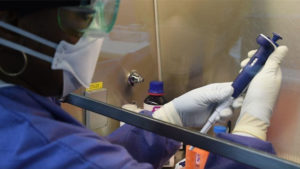 As the number of persons globally, the number of new cases and the death toll for the novel coronavirus continues a steady climb, the Caribbean Public Health Agency (CARPHA) announces it has established a lab to test for the virus.
As the number of persons globally, the number of new cases and the death toll for the novel coronavirus continues a steady climb, the Caribbean Public Health Agency (CARPHA) announces it has established a lab to test for the virus.
CARPHA says although the risk of the virus spreading to the region remains low, its medical microbiology laboratory is ready and fully equipped to test samples of suspected cases of the virus, now officially named Corona Virus Disease, abbreviated as COVID-19, in the event of an outbreak in the Region.
There are no direct commercial flights to the Caribbean from China, and travelers to the Region are screened multiple times prior to their arrival. However, the global situation is changing rapidly and CARPHA says it is monitoring to determine if sustained transmission of the disease occurs outside of China.
Dr. Joy St. John, CARPHA Executive Director said, “The Agency is equipped to investigate and manage communicable diseases. In the event of the suspicion of an outbreak in the Region, Member States have specific protocols to follow in their investigation process which includes sending the samples to CARPHA. We are prepared to receive and test samples of suspected cases of COVID-19 with immediate effect.”
The reference laboratory is accredited to the international standard for medical laboratories and all laboratory technicians are certified to handle and transport infectious samples in accordance with the World Health Organization regulations.
Head of the CMML, Dr. Gabriel Gonzalez-Escobar assured that all systems are in place, but noted that CARPHA does not accept samples directly from the public.
He said CARPHA will only receive and test samples from the national referral medical laboratories in Member States. Results for all samples tested at the CMML will be sent electronically to the national referral medical laboratories, who will then disseminate to the health care provider.
He further stated that test results for the COVID-19 should be provided within 48 hours, but turnaround time is subject to receipt of a sample in a timely manner.
CARPHA continues to urge residents and visitors alike to practice basic protective measures against the new coronavirus, recommending that persons maintain basic hand and respiratory hygiene, and avoid close contact, when possible, with anyone showing symptoms of respiratory illness such as coughing and sneezing.
CARICOM Secretary-General, Ambassador Irwin LaRocque, is commending the regional response mechanism engineered by CARPHA to keep the Community free of the virus.
Ambassador Laroque was speaking at the opening ceremony of the 31st Inter-Sessional Meeting of the Conference of Heads of Government of CARICOM in Barbados on Tuesday.
“The coronavirus has been deadly, claiming more than 2000 lives globally so far and proving difficult to contain; but we must stress that there are no cases in CARICOM.
“Although the WHO has deemed the risk to the Caribbean to be low we adopted a proactive approach and convened an emergency meeting of Ministers of Health for the virus with participation from CARPHA, PAHO, IMPACS, and CDEMA. The RSS has also played a critical role in transporting samples to laboratory testing at CARPHA.
“I must commend the collaboration that is taking place as another example of the coordination that is required in addressing some of the challenges to our integration process and to have a positive sustained impact on the lives of our citizens.”
Globally more 75,000 cases of COVID-19 have been confirmed and the death toll has exceeded 2100. According to the Chinese Center for Disease Control and Prevention it is up to 20 times more deadly than the flu, with a fatality rate of about 2.3%.
The WHO says it is working with an international network of statisticians and mathematical modelers to estimate key epidemiologic parameters of COVID-19, such as the incubation period (the time between infection and symptom onset), case fatality ratio (CFR, the proportion of cases that die), and the serial interval (the time between symptom onset of a primary and secondary case).
